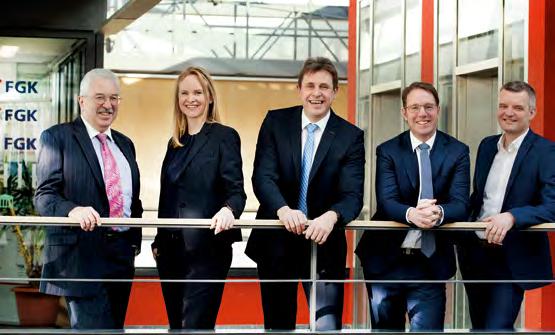Med t ech Companies



























Rarely are short, medium and long-term outlooks as divergent as they currently are in Germany’s medical technology industry. For 2022 – i.e. in the short term – the industry expects a nominal 3.5 per cent increase in turnover to 37.7 billion euros, according to the latest figures from the industry association Spectaris. “However, this is not a reason for joy,“ says Marcus Kuhlmann, head of it’s Medical Technology section. “The ability to compete and innovate, and thus the existence of many smaller and medium-sized medical technology manufacturers, is definitely at risk at the moment.” Why is that? Supply chain disruptions, the controversial EU Medical Devices Regulation and rising material, energy and logistics costs are increasingly putting a strain on business. For the coming year, the association expects growth to be even “weaker”. The industry generates two-thirds of its turnover abroad. In the first half of 2022, exports to Asia fell by 3.7 per cent, mainly because of the Corona lockdowns in China. Exports to North America increased by 8.5 per cent. The industry association expects four per cent growth in exports for the year as a whole, and three per cent nominal growth in the domestic market. The number of employees is expected to rise by three per cent to 159 000.
According to the latest economic survey by the Ifo Institute, however, most companies in the medtech sector expect the business situation to deteriorate in the next six months. 90 per cent reported production being hampered by material shortages, 40 per cent by a shortage of skilled workers – all factors that will also have a negative impact in the medium term. The war in Ukraine and the energy crisis it has triggered will not go away any time soon either. But the very diverse, rather mediumsized medical technology sector has also proven to be very resilient in the past. Entrepreneurial will and skills have been able to make up for many an external burden.
In the long term, the prospects for medical technology are still bright. In the coming decades, the world population is expected to rise from 8 to 10 billion people. As the climate catastrophe shows us, that is far too many for our planet. But until the number of humans decreases significantly, the populations in many countries will first age. And in old age, people are more often dependent on help - this increasing basic need plus the constant medical progress are brilliant general conditions, especially for the researching and developing medical technology industry. The 8th edition of the Guide to German Medtech Companies, which you – dear readers – are holding in your hands, offers a well-founded insight into the diverse corporate landscape of medical technology in Germany.
Andreas Mietzsch Publisher
 Christian
Sales & Marketing
Christian
Sales & Marketing
The Ukraine war – related global economic slowdown and the officially declared end of the COVID-19 pandemic will lead to a reduction in global government health spending. Spending will fall in real terms in 2023, predicts the London-based Economist Intelligence Unit (EIU). This will significantly affect medtech companies that develop and market in vitro diagnostics, medical devices, and digital health solutions. The EIU expects public and private healthcare spending to rise by 4.9% in nominal US-dollar terms in 2023, propelled by higher costs and wages. However, spending will fall in real terms as it fails to keep pace with inflation. EUI analysts estimate that in 2023 we will see a similar pattern as in 2022, meaning that 2023 will be the second successive year of a declline in real-term funding. According to the EUI healthcare outlook 2023, the gap between spending and costs will be most acute in Europe, where the medtech sector had €150bn in revenues in 2021 (27.3% of global sales), € 36.4bn of which were from German medtech companies, according to figures of MedTech Europe published in Q2/2022. Although healthcare spending is declining, the German medtech firms expect their sales to increase by 3.3% this year (see page 8).
In addition to the dramatic increase in production costs due to the war-related energy crisis, the European medtech industry – and with it Germany as the undisputed No. 1 in terms of jobs, annual turnover, and exports of medical technology products (see figures pp. 8–10), is facing challenges due to the expected impact of stricter legal regulations at EU level and thus increased expenditures for companies. In particular, the EU Ecodesign Regulation, the tightening of legal regulations in the course of the creation of an the EU Health Data Space (EHDS), and delays in the certification of medical devices according to the Medical Devices Regulation MDR should be mentioned here.
The European Green Deal and the European Circular Economy Action Plan (CEAP) are successively expanding product requirements in the European internal market to include ecological aspects. Future obligations under the EU Ecodesign Regulation include environ -
mental life cycle assessments, minimum recycling rates for materials, reparability, and the publication of certain information in the form of a digital product passport. Manufacturers face the task of evaluating these new requirements at an early stage and implementing them within their companies.
EU Regulators are also set to monitor the use of health data more strictly in 2023 than before. From maintaining electronic medical records to launching online health apps, the digitisation of the healthcare sector will remain a key trend in 2023, according to the EIU. However, concerns over the protection of health data will increase. The EU aims to invest € 220m by 2027 in the development of the EHDS, a cross-border digital platform through which people can control their electronic health data. The aim is to ensure data privacy, building on the EU’s General Data Protection Regulation, while making the bloc’s data more interoperable and accessible. The UK has a similar action plan. Such initiatives are likely to be copied elsewhere, after the World Health Organisation (WHO) pledged to partner with the EU in 2023 to carry out the plan. The industry association Spectaris also sees the future field of AI applications

endangered by the European Commission’s draft Artificial Intelligence Act. The AIA contains a far-reaching catalogue of potential specifications for medical devices, manufacturers, and users. According to Spectaris, the EU Commission’s objective of creating innovation-friendly framework conditions for AI in the EU is “clearly undermined”: AI-driven solutions are classified as high-risk technology and thus their development is being delayed in comparison to the rest of the world.
According to the German Medical Technology Association (BVMed), new figures from the European Commission on the EU Medical Devices Regulation (MDR) show that even after more than five years of implementation, the MDR regulatory system still does not have sufficient certification capacities. Specifically, BVMed calls for an extension of transition periods that will end next year and the abolition of the existing sell-off period for already certified products by 2025. The association is particu -
larly concerned that while 8,120 applications have been accepted (by October 2022) and 1,990 MDR certificates issued, 23,000 certificates still need to be transferred before the transition period expires – more than three quarters of the certificates (17,000) expire in May 2024. According to BVMed, the processing time for 82% of the certificates is between 13 and 18 months, for 18% even between 19 and 24 months. “Unless immediate action is taken, Europe faces a scenario in which a large number of existing medical devices.... will not be recertified in time and therefore run the risk of disappearing permanently from the market,” says a letter coordinated by the European umbrella organisation MedTech Europe. Due to a significant increase in the cost and personnel involved in the certification of medical devices, manufacturers are being forced to withdraw safe and proven products from the market. A supply bottleneck is already emergingas a result. Because more and more companies (80%) see the MDR as a brake on innovation, many are currently seeking initial registration of new products in the US because the market is twice as large as the EU market and reimbursement conditions seem more attractive. Switzerland recently sent a signal and now also accepts FDA-approved medical devices.
Following signs of modest growth of German companies in 2021, an industry survey published by BVMed in November 2022 gives a pessimistic outlook. Overall 2021 key figures showed that most of the 13,450 German medical technology companies, 93% of which are SMEs, weathered the COVID-19 pandemic better than expected, particularly developers of solutions to prevent, monitor, or treat COVID -19 related diseases. In addition, trends such as digitisation and artificial intelligence had an economic growth impact on medical technology companies in 2021, as did the general trends of an ageing and more health-conscious society. For 2022, however, 50% of the BVMed member companies expect a decrease in the sector’s growth curve. Due to dramatic cost increases, the profits of medical technology companies in Germany will decline. Only 11% of medtech companies expect profit increases this year, while 62% expect a worsening of the profit situation.
Name ›
Address/P.O.
FGK Clinical Research GmbH

Heimeranstr. 35
80339 Munich
Bavaria
Martin Krauss, Dr Edgar Fenzl
+49-89-893-119-0
martin.krauss@fgk-cro.com
edgar.fenzl@fgk-cro.com
www-fgk-cro.com
www.fgk-rs.com
www.fgk-pv.com
210 2002
Areas of Activity
Full service CRO (contract research organisation) offering a complete range of clinical development and consulting services all over Europe and the US:
| Regulatory Affairs
| Project Management and Monitoring
| Medical Safety
| Data Management/Biostatistics
| Medical Writing
| eSolutions for Clinical Trials
| Quality Assurance
FGK Clinical Research has two daughter companies:
“FGK Pharmacovigilance” and
“FGK Representative Service”, enabling us to offer our clients pharmacovigilance services including services of QPPV and PMSF management as well as legal representation for non-European customers conducting clinical studies or seeking marketing authorisation within the EU/EEA.
BVMA - Federal Association of Contract Research Organisations
FGK Clinical Research is a Europe-based CRO of an ideal size for cooperation with smaller and mid-sized medical device, biotech, or pharmaceutical companies. FGK was founded in 2002 and currently has 210+ employees – most of them located in our headquarters in Munich and our branch office in Berlin, Germany. Covering all phases and areas of clinical development, we have experience in every important medical indication, including in particular oncology, cardiology, neurology, dermatology, and gastroenterology. Broad knowledge in alternative therapies completes our expertise. Besides our services for drug development, we also help to guide all kinds of innovative medical devices through the increasingly demanding framework of clinical investigations.
We directly supervise international projects with own employees located in our German offices and our subsidiaries in the Czech Republic, Hungary, and Poland; For study sites in additional countries such as the US, we have suitable long-term partners.
The main philosophy for FGK is to prepare and conduct studies in close cooperation with the sponsor. Thus, we not only closely interact with our clients throughout the project but long beyond, as maintaining a good relationship forms the basis for long-term cooperation. Our operational team works hand in hand with all other departments involved. This also applies for the project manager, who is the central contact person delivering all required information to the sponsor. Timely approvals and efficient trouble-shooting are achieved through a combination of centralised project management and local monitoring, as well as local expertise in regulatory submissions within the country of study conduct.
Services
Regulatory Affairs

› Consulting on regulatory topics

› Review of study documents (e.g. protocol, informed consent form, labels)
› CTA with submission to authorities and ECs
Clinical Operations
› Project management, primary liaison for sponsor communication, status reports, etc.
› Feasibility, contract negotiations, site management, monitoring, etc.
Medical Safety/Pharmacovigilance
› Adverse Event Management and assessment/reporting
› Drug safety, medical monitoring and coding of medical terms
› Pharmacovigilance – also visit www.fgk-pv.com
Medical Writing
› Investigator’s brochures, study protocols, ICF and subject information
› Clinical expert reports, clinical publications, IMP and submission dossiers
Data Management
› CRF design and review, clinical trial databases
› Data validation, processing and cleaning, external data handling, CDISC SDTM
Biostatistics and Programming
› Study design, sample size calculations
› Statistical consultancy, analysis plan, programming and reporting
› CDISC ADaM
Quality Assurance
› Audits of investigator site, database and system audits, internal audits


› SOP composition and implementation
eSolutions
› eCRF, IWRS/Drug supply, eTMF, CTMS